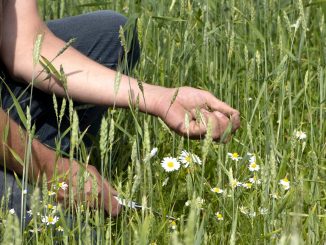A vote in the European Parliament this coming Wednesday 14th June will be crucial in deciding whether pesticides will be banned from Ecological Focus Areas (EFAs). It is a simple majority vote by MEPs, and it is likely to be tight. While there are a number of amendments to the Delegated Act being presented to the parliament, the main one is on pesticides and EFAs. Here we outline what you can do, make the case for keeping pesticides out of EFAs, and myth bust some common misconceptions on pesticides and EFAs.

What can you do?
Contact your MEPs before noon on Wednesday and encourage your MEP to vote “with the Commission Delegated Act proposal“. Voting this way can also be referred to as “voting against the objection“. The best way to contact your MEP, in order of impact, is: in person; on phone; via email, via social media. If you do contact your MEP read the myth busting section below in advance. Organisations like Birdlife Europe are worth following on twitter to keep up to date with the week’s events. (See the Birdlife_EEB Briefing_for Plenary Vote). In German, NABU have an excellent resource.
Why support the ban on pesticides in EFAs?
EFAs were introduced into CAP to bring back biodiversity on farms – that’s their primary purpose. They take up just 5% of a farm’s arable land. They are designed to deliver key ecosystem services useful for farming, such as pollination, pest control, nutrient and water cycling. There has been strong momentum for some years to ban pesticides from EFAs as this would make the policy fit for purpose. Its worth remembering that there never were supposed to be pesticides used EFAs – this was a late and very controversial change in the previous CAP reform process. Banning pesticides from EFAs would enable biodiversity to work for farmers, while also bringing ecology back into the Ecological Focus Areas.
The main recommendation from a December 2016 report from the Institute for European Environmental Policy (IEEP) is that pesticides and fertilisers should not be used in these EFAs in order for them to be beneficial for biodiversity. According to IEEB:
“under the current EFA rules and conventional farming practices it is unlikely that most nitrogen-fixing crops and catch and cover crops grown on EFAs provide significant benefits for farmland biodiversity. In contrast, the EFA options of land lying fallow, hedges, and field margins generally have the potential under typical management to provide much greater, more diverse and more reliable biodiversity benefits”.
Writing on the ARC2020 website last week, Sebastian Lakner also presented detailed evidence of the failings of EFAs as they currently operate, in this case for Germany. By allowing these crops with pesticides into EFAs, fewer genuinely ecologically beneficial options are being chosen by farmers.
In short, we need to improve EFAs – banning pesticides from EFAs would be a start, as it would ,among other things, make protein crop growing less attractive in EFAs. This would help encouraging changed farmer behaviour regarding EFA options.
Regulatory process – what’s happened so far & what’s next?
The Commission, as part of its drive for simplification in the CAP, in February presented a number of amendments to what are called the Delegated Acts – the main way laws passed at EU level (see notes section below). These related to young farmer payments, hemp, coupled support, as well as other aspects of greening and payments.
Two members of the Committee for Agriculture, Mr. Dess (EPP, DE) and Mr. Agnew (EFDD, UK), lodged a resolution for opposition against the whole Commission proposal based on one element – the ban of pesticides in EFAs. The AGRI committee (COMAGRI) voted in favour of this objection on 30 May 2017. It will now go to plenary on Wednesday 14th June, around midday/lunchtime. There will, it appears, be no debate. Under the rules on delegated act, only a majority of MEPs – a total of 376 – will need to vote in favour of the resolution to stop the delegated act and hence to allow for pesticides to continue being used on EFA.
The vote is likely to be tight – at present, Greens GUE-NGL, ALDE outside of COMAGRI, Five Star and, crucially, a majority but not all of S&D MEPs will vote with the Commission proposal, which means will vote to ban pesticides from EFAs. Spanish, Italian and Romanian S&D MEPs – about 30-40 MEPs at least, are likely to vote in favour of the objection resolution (i.e. to allow pesticides in EFAs). So it will be close vote – which means its important to contact your MEP.
Myth Busting – aka spurious arguments, the story so far
Myth 1: EFAs with protein crops (and thus pesticides) help the EU with protein independence.
Fact: EFAs are designed primarily to deal with biodiversity, not protein crops.
Everything else in EFA legislation is subservient to this core purpose – protecting and enhancing biodiversity. This is much evidence for this. First, the Commission itself wants to close this loophole. As the Commission wrote in its report on EFAs 29th March: “The EFA requirement’s objective is ‘in particular, […] to safeguard and improve biodiversity on farms'”.
Moreover, as a letter signed by MEPs (PPP_on_EFAs) in October 2016 stated: “a recent EP (European Parliament) resolution on the EU’s Biodiversity Strategy stressed “that EFAs should in principle be areas for the protection and promotion of agro-ecological processes such as pollination and soil conservation”. Likewise, a recent opinion by the European Economic and Social Committee noted that “the fact that the use of pesticides is to some extent permitted in ecological focus areas is diametrically opposed to the intention of greening agricultural policy: pesticides do not help to increase biodiversity but rather limit it.”
In any case, there is other legislation to deal with protein crops: there are special schemes like the coupled support schemes for nitrogen fixing (i.e. leguminous/protein) crops to cover this specific topic. Moreover, the compulsory greening payment which includes the EFA obligation is not meant to be a support for leguminous production.
The tiny area EFAs make up – just 5% of arable land – could never supply the quantities of required protein crops for the EU, or even significantly contribute to it. If EFAs did do this, supported through the continued use of pesticides, there would inevitably be a requirement for new areas to be established. These areas would have to allow biodiversity to flourish, and for the ecosystem services biodiversity provides, such as pollination, to be generated. Sounds familiar? Yes that’s ecological focus areas!
Myth 2: COMAGRI were right to reject the Commission package because it was large.
Fact: Packages are often voted on.
Not only are packages often voted on, in any case, this is part of the simplification process MEPs are supposedly in favour of. The pesticide aspect of the Commission proposal is the most important of all elements, as evidenced by the fact that because of this one amendment MEP Dess lodged a resolution for opposition to the whole Commission proposal, which lead to COMAGRI rejection of the proposal.
MEPs who ostensibly oppose the use of pesticides in EFAs – having signed the above letter to this effect – have tried to use this argument. When queried about this tweet from Birdlife Europe
Bravo @mattcarthy! You’re now the MEP for #pesticides! Redeem yourself at #EPlenary in June! https://t.co/UuAV4fg7K8 pic.twitter.com/nkYaFl74Jx
— BirdLife Europe (@BirdLifeEurope) June 7, 2017
in a twitter exchange with our Communications Director Oliver Moore, Irish MEP Matt McCarthy – who actually signed a letter against pesticides in EFAs – replied:
SF support ban on PPPs on EFAs.No support 4 Hogan’s all or nothing approach to CAP review which doesn’t allow MEPs to make amendments though
— Matt Carthy MEP (@mattcarthy) June 7, 2017
(PPP’s are ‘plant protection products’, aka pesticides) However, as Birdlife Europe have pointed out:
“Some members have used the procedural argument to justify opposition to this Delegated act, contending that it is not typical process to vote on several measures in one block. However, there are several precedents for this in the parliament for example in the delegated acts on rural development or direct payments that proceeded the last CAP reform. With these precedents, the vote should be made on the basis of policy, where it is clear that policy must be improved and the commission proposal supported.”
Carthy did not reply to further communications via twitter to outline his issues with the Commission package. However, he and other COMAGRI MEPs have prioritised what is in effect a spurious procedural issue over the huge issue of pesticides in EFAs. It will be interesting to see how GUE MEPs like Carty vote on Wednesday, as it is understood that GUE will vote with the Commission Delegated Act proposal.
Myth 3 EFAs are a waste of precious land in a time when we need to increase food production to feed the world.
Fact: EFAs increase yields. What is more, rather than taking land “out of production” and so decreasing yields – as the agri-business lobby claims functional biodiversity on farms actually increases yields on the whole farm agro-ecosystem. This happens by allowing beneficial species to thrive – by providing some space in a landscape dominated by farming, and by not using biocides to kill them. Thus, natural processes such as pollination, predation of pests, nutrition and defense of crops can flourish. In fact, yields have been show to increase rather than decrease (EIP report)
– wheat by +12%
– peas increased by a quarter, +26%
– carrots increased by one third, +32%
(Full peer reviewed publication EIP report above references above is here: Wackers et al 2012). This happens because of the ecosystem services biodiversity provide such as increased pollination efficiency because of more pollinators, better regulation of crop pests by natural predators, more beneficial species underground in the soil defending crops and helping deliver nutrient to their roots.
Myth 4: Crops grown in EFAs with the help of pesticides help fight climate change.
Fact: see Myth 1. Replace “protein crops” with “climate change”.
Notes
What is a Delegated Act?
There are two types of instrument the European Commission may adopt in order to ensure the implementation of EU law – Delegated acts and Implementing Acts. Delegated acts are considered closer to actual law-making – they may supplement or amend something of the original legislation. In layman’s terms, delegated acts should legislate upon the ‘what’. They represent an explicit decision by the EU legislators (Parliament and Council) to grant the Commission power to act on a certain issue. The extent of the delegation has to be clearly
determined in the original legislation and the Commission can only legislate within those boundaries. For more see introduction-to-delegated-and-implementing-acts.
There is Lots of info on pesticides and EFAs at our 2014 campaign page when this was last an issue.
Ecological Focus Area in Germany: What Influences Farmers’ Decisions?





